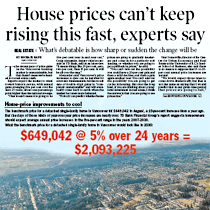What’s debatable is how sharp or sudden the change in the housing market will be
Michael Kane
Sun

What’s debatable is how sharp or sudden the change will be. Photograph by : Vancouver Sun
The recent pace of price gains in the Vancouver housing market is unsustainable, but that doesn’t mean we’re headed for a real estate crash.
Experts expect the market to trend toward historic norms, with annual gains averaging five per cent over the next 25 years, about one percentage point higher than the national average.
“That doesn’t mean it is going to be five per cent year in and year out,” Craig Alexander, deputy chief economist at TD Bank, said in an interview. “It means things like 20 per cent, zero, two per cent, then 15 per cent. It will be all over the map.”
Alexander said Vancouver’s price increases to date can be justified by economic fundamentals, but the recent rate of double-digit gains is “completely unsustainable” and will eventually come back to earth when the market becomes more balanced.
“Nobody can predict whether home prices are going to gradually decelerate and come in for a perfectly soft landing, or whether you are going to get a pullback in prices,” he said.
“You can’t rule out the possibility you could have a 20-per-cent gain and then a mild decline, and then a gain again another year. You can’t rule out the possibility you are going to get cycles in housing. But over the long haul, if you are thinking about a long-term investment in real estate, I think the answer is that you are going to see prices rise.”
Tsur Somerville, director of the Centre for Urban Economics and Real Estate at the University of B.C.’s Sauder School of Business, also said there is no reason to suppose that 15- to 20-per-cent annual price increases are normal.
“We would expect those rates to come down dramatically, but that is not the same as saying that I would predict that in any given time period that prices are going to fall,” Somerville said.
“We ought to come back to some sort of historical norm or long-term trend, but how we get there — whether it will be a period of declining prices or just a period of below-average price increases — is hard to figure out.”
The recent rate of home price increases cannot be sustained because it is not matched by similar growth in household incomes, said Cameron Muir, senior market analyst with Canada Mortgage and Housing Corp. in Vancouver.
“While we expect the market to trend to more balance over the next 12 months, the solid economic outlook for B.C. and greater Vancouver will sustain demand in the sense that we don’t expect any significant price reductions,” he added.
That view is echoed by David Baxter, executive director of Vancouver’s Urban Futures Institute, who said the impact of lower interest rates, and home equity gains that have allowed some buyers to move into more expensive homes without taking on a bigger mortgage, has largely been captured in current prices.
“There is not a lot upside left in the housing market beyond inflation,” Baxter said. “I would argue that all of the risks are on the downside in the sense that interest rates aren’t likely to go down again and the economy in terms of being a commodity-driven economy isn’t likely to get much better than it is. Having said that, I don’t think there is a lot of risk in either scenario.”
While Vancouver home prices rose by an annual average rate of 6.8 per cent between 1981 and 2005, that era included periods of high inflation. With central banks holding inflation in check, Alexander anticipates average annual gains of about three per cent, plus two per cent inflation, during the next 25 years.
For the country as a whole, he expects annual gains totalling four per cent but said the largest cities will continue to experience above-average price gains with Vancouver and Toronto in particular benefitting from an increasing reliance on immigration to fuel population growth.
He noted that B.C. is is blessed with both a mild climate and a strong economy to attract migrants and is forecast to lead Canada’s population growth through 2030.
In a report released Thursday, Alexander concludes that fears an aging population will significantly depress home price growth are overblown. Although slowing population growth will act as a constraint on price gains, the impact will be offset by higher home ownership rates, tighter labour markets that boost incomes, and more modest new home construction.
He said the stars are also aligned for Calgary and Edmonton to experience above-average price growth thanks to favourable economic prospects, lower tax rates, stronger projected population growth and a younger population than many other provinces.
Conversely, less supportive demographics suggest Halifax, Kitchener and Waterloo, London, Ottawa, Gatineau and Quebec City will experience slower than average growth for resale prices over the next 25 years.
© The Vancouver Sun 2006

